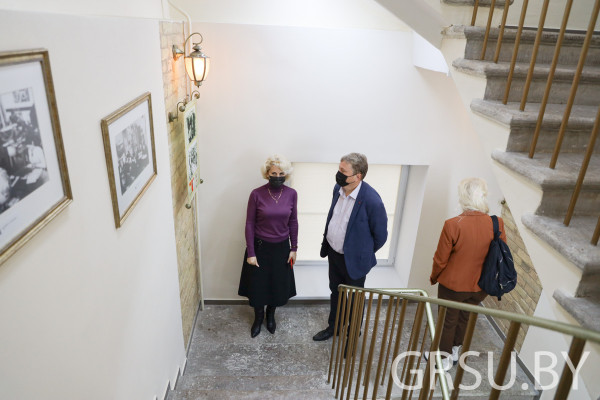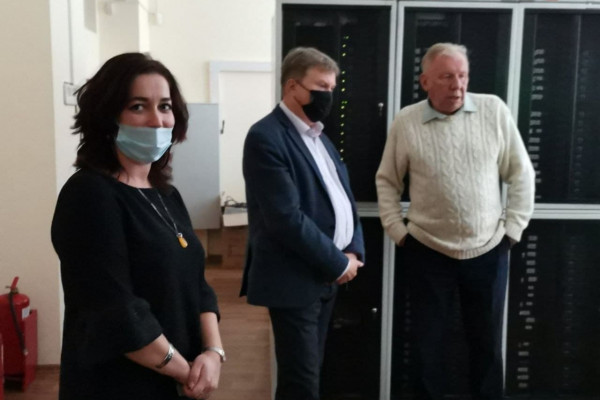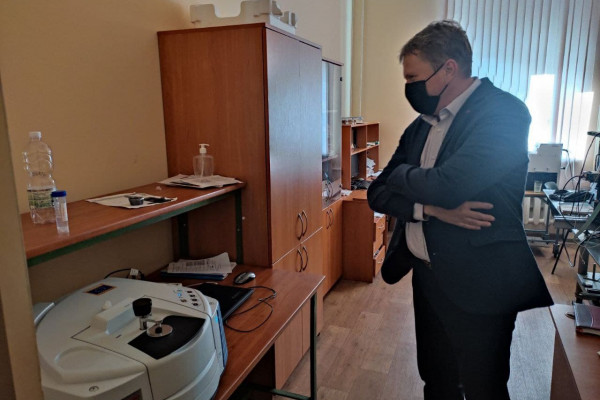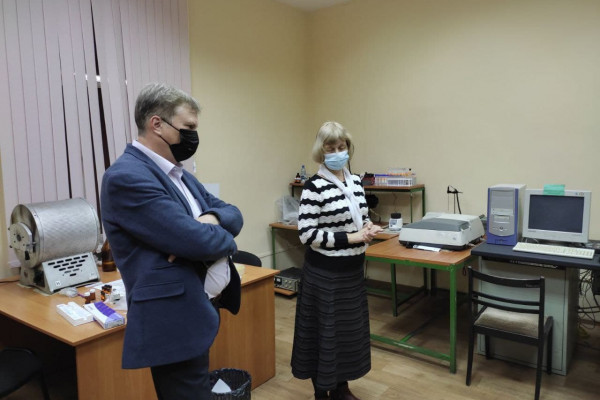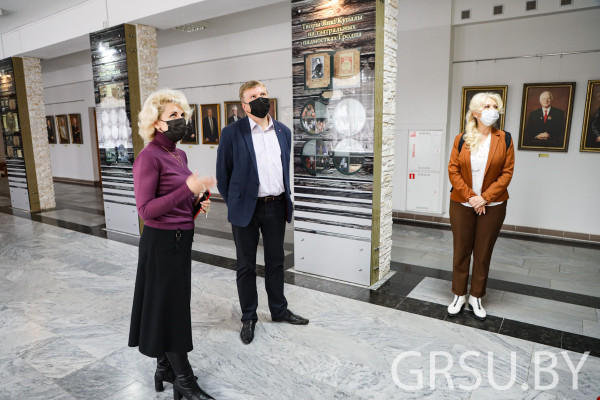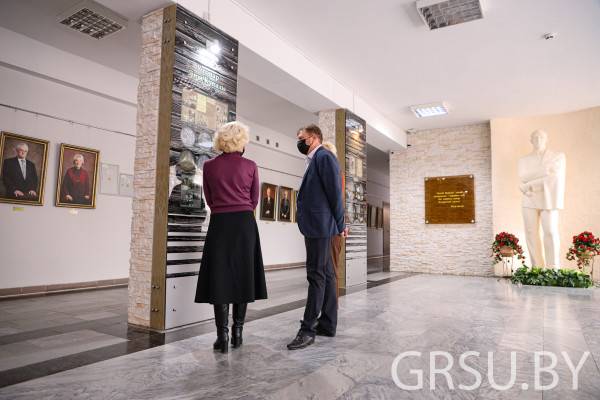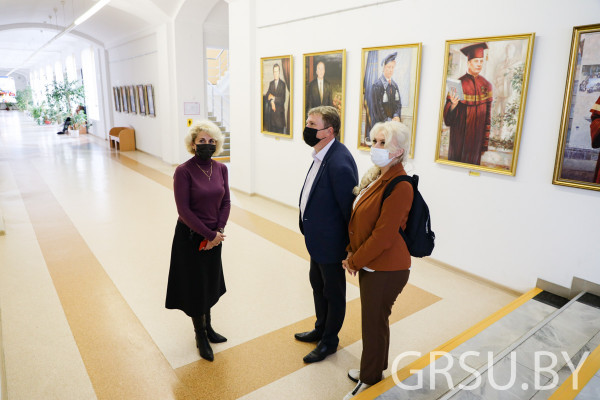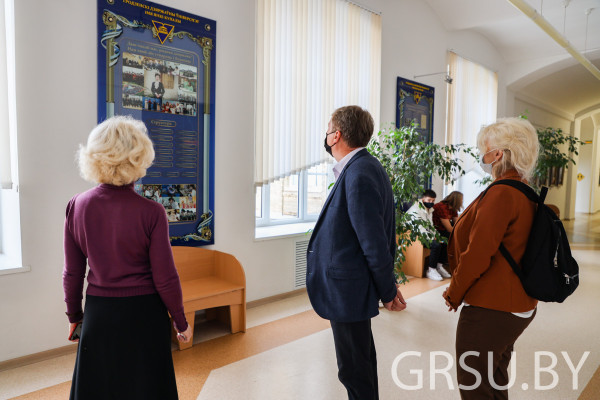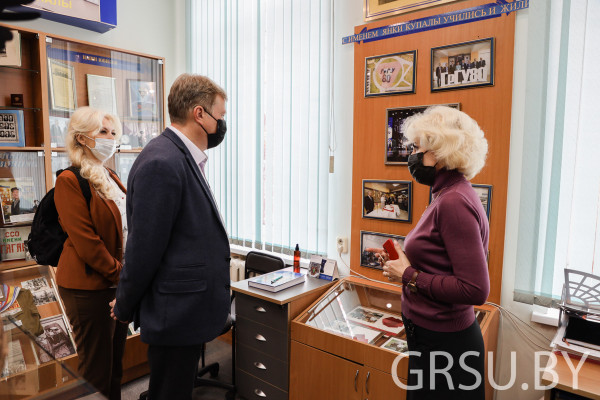
Yanka Kupala
State University of Grodno
Super User
Yanka Kupala State University of Grodno will host an international ecological conference
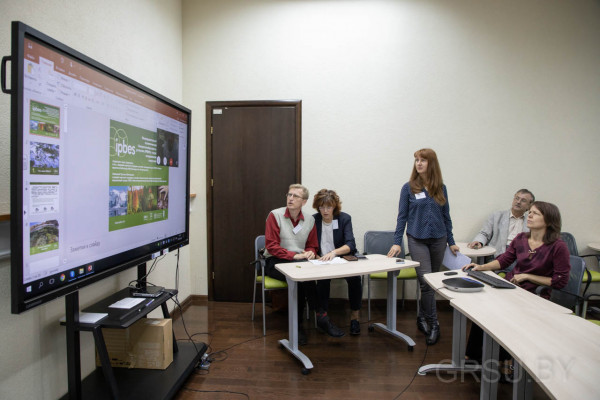
The International Scientific and Practical Conference "Actual Problems of Ecology - 2021" will be held for the sixth time and will bring together almost 100 participants from Russia, Turkey, Kazakhstan, Poland, Lithuania, Ukraine and Belarus.
Participants will discuss issues related to the protection of flora and fauna, sustainable land use, environmental education and education for sustainable development, air pollution monitoring, climate management and other important topics. Most scientists will participate in the conference in the online format, but some will speak at the walls of Yanka Kupala University. According to the conference coordinator Galina Yukhnevich, one of the main goals of this scientific meeting is exchange of experience and knowledge.
- From year to year the thematic field of the conference changes and extends. Life does not stand still, new data and research appear. For example, recently the question of environmental pollution by microplastics has been raised more and more often. Another hot topic is human health, which in the modern world is exposed to various natural influences and microorganisms. Each conference turns out to be interesting and productive, it is nice to see that this scientific meeting arouses interest and collects excellent reports, - said Galina Yukhnevich.
The XVI International Scientific and Practical Conference "Actual problems of ecology - 2021" will take place on September 22-24. It is organized by Yanka Kupala State University of Grodno, the Grodno Region Committee on Natural Resources and Environmental Protection and the University of Bialystok. It is planned to publish a collection of materials by the results of the conference with assignment ISBN and registration in the Russian Science Citation Center.
Yanka Kupala State University of Grodno hosts the Week of National Unity

Students and staff of Yanka Kupala University have joined numerous events dedicated to the celebration of the National Unity Day.
Yanka Kupala State University of Grodno has already held dialogue platforms with scientists-historians and representatives of the newspaper "Zviazda", the leaders of the youth movement and the university administration. Yanka Kupala State University of Grodno hosted a meeting of students and employees of three Grodno universities with the chairman of the Synod Department for cooperation with secular educational institutions Archpriest Fyodor Pobny. For first-year students an event dedicated to the reunification of the Belarusian people on September 17, 1939 was organized. A whole cycle of meetings with first-year students was planned in the "Krasnaya Zvezda" cinema. In addition, Yanka Kupala students took part in a motor rally on memorable places of Hrodna region, also dedicated to the Day of National Unity.
During the week there will be a presentation of creative groups of Yanka Kupala State University of Grodno and participation of Yanka Kupala students in the national day of good deeds, in the national action "Strength in Unity" of "Belaya Rus", in the open competition of Hrodna higher educational institutions "I love you, My Belarus" and competition of reciters of Belarusian poetry "I'll never be parted with you again". Various events - concerts, challenges, contests, flash mobs - are held at all faculties and departments of Yanka Kupala University as part of the Week of National Unity. A detailed program of events can be found here.
All students and staff members of Yanka Kupala State University of Grodno are invited to take part in the festivities on National Unity Day, September 17. On this day Kupala students will join the city bicycle race of student youth "We are united".
The Scientific and Technological Park of Yanka Kupala State University of Grodno hosted a one-day reception of entrepreneurs
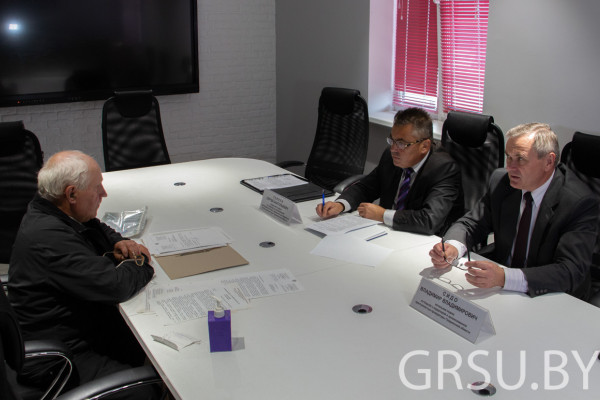
Representatives of the Prosecutor's Office of Grodno region and the Republican Confederation of Entrepreneurship answered questions of citizens within the theme "Problematic aspects of the legislation in business".
The meeting was held in the format of an open reception room where any entrepreneur could get professional advice. Representatives of authorities, prosecutor's office and tax inspection answered the questions.
It is absolutely not by chance that the single day of reception was held on the basis of the Technological park. There are all the conditions for holding events of different levels.
- The Technological park has a strong technological base, and any meeting can be held here. Soon our possibilities will be extended. The second stage of the Technological park is about to be commissioned. This means that a new conference room for a hundred people will start working. The participants of the events will have modern telecommunication means, a large screen and the possibility of simultaneous interpretation into 4 languages. Undoubtedly, this venue will become one of the leading ones in Grodno," said Alexander Vasilevich, Principal of Scientific and Technological Park of Yanka Kupala State University of Grodno.
By the way, one of the main directions of work in the current five years is the development of the regions. And technological parks are one of the reference points of economic improvement in the regions. Innovative projects and breakthrough ideas are implemented in the Scientific and Technological Park of Yanka Kupala State University of Grodno. And what is remarkable is that young people are actively involved in this process. There are many students on the list of Technological park residents who develop successful startups. With the commissioning of the second stage, the Technological park will reach a completely new level. The entrepreneurs will have 6500 square meters at their disposal, 16 production and office premises, an exhibition hall, a co-working area.
The Technological park began its history in 2017 on the basis of "Technolab", the founder of which is Yanka Kupala State University of Grodno. In 2018, the first stage of the Technological park with an area of about 1,000 square meters was commissioned. Since then, the company has only been increasing its capacity.
Vladimir Kosov, Professor of the Abai Kazakh National Pedagogical University visited Yanka Kupala State University of Grodno
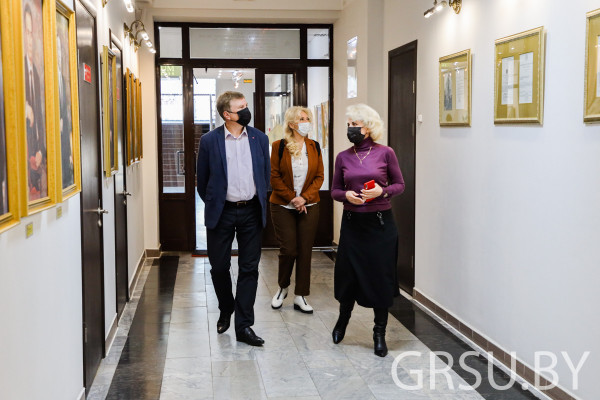
Vladimir Kosov, Doctor of Physical and Mathematical Sciences, Corresponding Member of the National Academy of Sciences of the Republic of Kazakhstan got acquainted with the scientific potential of Yanka Kupala State University of Grodno.
During the visit, a meeting between Vladimir Kosov, Professor of the Abai Kazakh National Pedagogical University and Yuri Belykh, Vice-Rector for Academic Affairs at Yanka Kupala State University of Grodno, was held. During the meeting prospects of cooperation between higher education institutions were discussed.
Vladimir Kosov also visited the Faculty of Physics and Technology of Yanka Kupala State University of Grodno and got acquainted with the activities of the research laboratories of molecular-level spectroscopy, optics of nanostructures and radiation material science. Laboratory staff told about the scientific potential of the Faculty of Physics and Technology, indicating the demand for scientific equipment by the teams of many institutions of higher education and scientific organizations.
The autumn festival "Marathon of Sports and Health" ended at Yanka Kupala State University of Grodno
The autumn festival "Marathon of Sports and Health" ended at Yanka Kupala State University of Grodno

During the past working week, sports excitement covered staff and students of Yanka Kupala State University of Grodno. The arena for sports battles was the stadium in the campus at Zakharova Street, 32.
On the last day of the sports marathon, teams at the stadium fought in various directions! Kupala representatives played in a bocce, volleyball and football competitions, spun hoolahups. They found out who is the most apt, knocking out the "apples" in the darts. The combined relay was large-scale and spectacular. As Irina Kiturko, rector of Yanka Kupala State University of Grodno, noted that sports meetings have become a good tradition for us.
"I want to thank everyone for participating in the marathon, contributing to the promotion of a healthy lifestyle and strengthening of corporate culture. In the last year, we live in difficult epidemiological conditions, and in the open air we have the opportunity to communicate more freely and not hide smiles behind masks. Today's competitions have become special, because for the first time in the framework of one team, both professors and students united, which further strengthens our corporate spirit and confirms that we are members of our University - one big family", Irina Kiturko said.
6 teams participated in the marathon. The first included representatives of the faculties of Economics and Management, Innovative Mechanic Engineering, Philology and Military Faculties. Representatives of the Faculty of Physical Education and Pre-University Training, as well as Pedagogy and Engineering and Constraction Faculties, made up the second group. In group number three were representatives of the Faculty of Mathematics and Informatics, the Faculty of Psychology and Physico-Technical Faculty. The fourth group gathered under its number representatives of Faculty of History, Communication and Tourism, Faculty of Arts and Design, Biology and Ecology, and Faculty of Law. The fifth group included representatives of Humanities and Technology Colleges of Yanka Kupala State University. The sixth group consisted of representatives of the rectory, university-wide structural divisions, the students' trade union committee, BRYU members, and the Student Coordinating Council.
The Dean of Faculty of Physical Education Vitaly Khramov emphasized that the atmosphere at the autumn festival "Marathon of Sports and Health" is friendly and charging. And the weather is excellent, has an active pastime.
Yanka Kupala State University pays great attention to a healthy lifestyle. Students and professors have the opportunity to visit the sports halls of the buildings and stadiums, and the trade union provides a discount on subscriptions to the pool, gyms and sections. Olga Rusilko, secretary of the primary organization of the BRYU of YKSUG, always tries to keep her strength up.
"The mood is excellent and gambling. Despite the fact that we are all colleagues, a competitive spirit was present. It's great that so many participants gathered at the marathon! We competed, and talked. The atmosphere is friendly, it's wonderful that professors and students have the opportunity to fight together for sports victories", Olga shared.
The autumn festival "Marathon of Sports and Health" undoubtedly charged everyone with a positive and good mood. On the fifth last day of the competition, the team "the gold" went to the second group. The silver owners were participants from the first group, and participants of the third group won the bronze. In addition, teams in each sports discipline were separately awarded.
By the way, not only the final day of the autumn marathon was saturated. Sports competitions were held from September 6 to 10. On Monday, September 6, a 3x3 basketball tournament was held on the basketball court of Yanka Kupala State University. On Tuesday, our people found out which of them was the best in table tennis. Wednesday was the day of beach volleyball, and Thursday - of mini football. In total, more than 300 members of our university took part in the marathon.
Vaccination of students and university staff continues at Yanka Kupala State University of Grodno
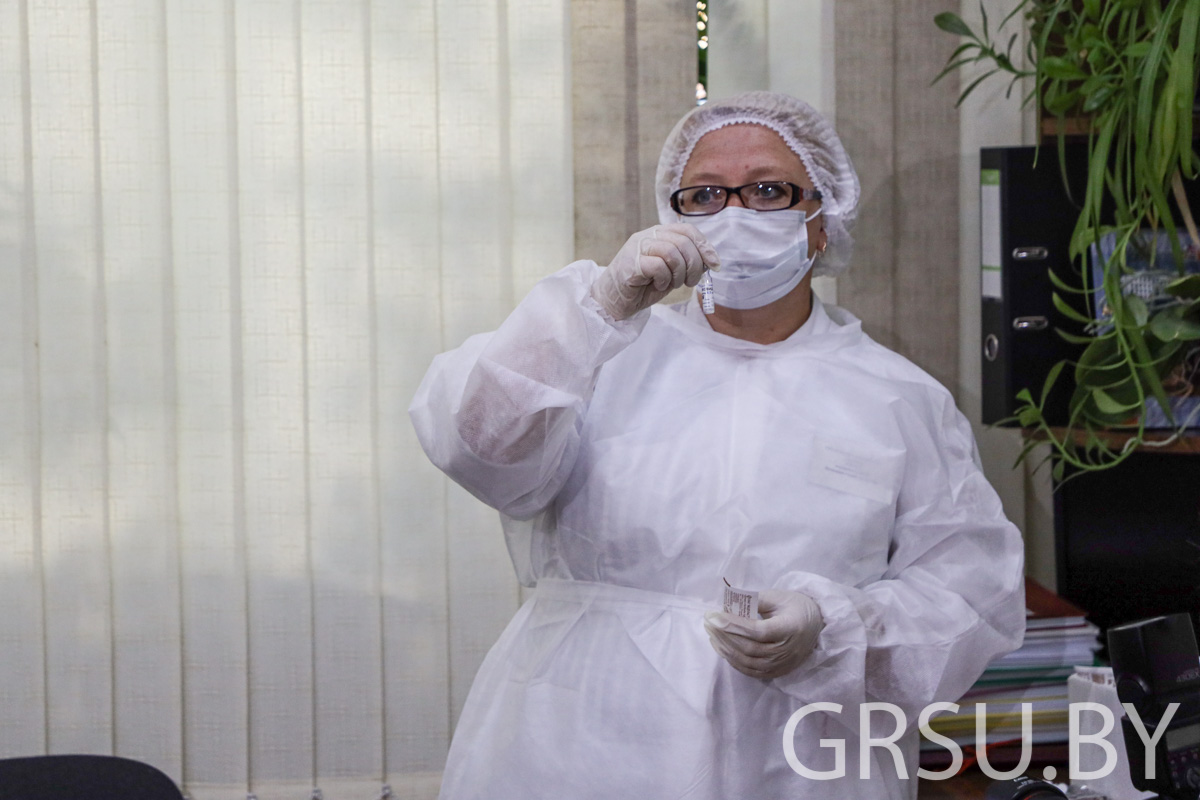
On September 14 and 15, visiting vaccination stations will work in the university buildings.
The vaccination campaign at Yanka Kupala State University began in mid-February, during that time more than 50% of staff were vaccinated. For greater convenience of our students, the health center organizes vaccination-away points. On September 14, it will be possible to be vaccinated in the campus at Dovatora street, 3/1, office No. 110 from 1p.m to 3p.m. Also on September 15, the vaccination room will open in the campus at Oktyabrskaya Street, 5 in audience 102 from 1p.m to 2p.m.
"Since February of this year an active vaccination to staff and students began. They responded well to this opportunity. There were especially many who wanted it in the summer time. This is primarily due to the reception campaign and the start of the educational year. Students also join the staff. Many of them are already coming with vaccination certificates", Irina Kiturko said, the rector of Yanka Kupala State University of Grodno.
As Marina Kravets, head of the health center of Yanka Kupala State University, noted that before vaccination staff and students undergo a primary checking-out with an immunologist. The doctor draws attention to the mucous membranes, blood pressure, temperature. The doctor necessarily collects an allergological history. If everything is good, a university member is vaccinated. Vaccination takes place in two stages. After receiving the first component of the vaccination, 21 days should pass.
"All previously vaccinated staff and students feel good. We always remind our people: if any questions arise, you can always call and consult, and in case of the slightest deterioration, you must also report. Do not worry if it was not possible to come to the vaccination during mobile vaccination. You can get vaccinated at the health center of our university. Such a large number of professors have already been vaccinated. Students are still included in the process, I hope they will follow the example of professors", Marina Kravets said.
Last week, on Thursday, September 9, vaccination could be done in the production and laboratory corpus at Kurchatova street, 1a. On Friday, a mobile vaccination was organized in the main campus of Yanka Kupala State University of Grodno. The vaccination company will continue.
Archpriest Fyodor Povny, Chairman of the Synodal Department for Cooperation with Secular Educational Institutions, visited Yanka Kupala State University of Grodno
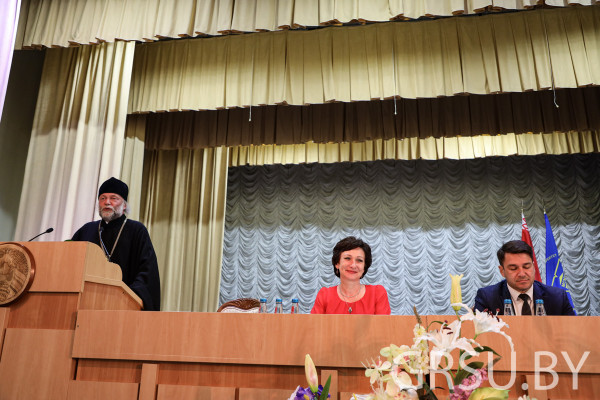
The meeting of Archpriest Fyodor Povny with students and university staff of three universities of Grodno took place on September 13.
Participants of the meeting - our students, as well as colleagues from the State Medical University of Grodno and State Agrarian University of Grodno - were greeted by the rector of Yanka Kupala State University Irina Kiturko. At the beginning of the event, Irina Fedorovna shared her impressions of personal communication with the chairman of the Synodal Department for Cooperation with Secular Educational Institutions, Rector of the Parish of All Saints Church of Minsk Archpriest Fyodor Povny.
"Father Fyodor for the second time speaks within the walls of our university, and I am very grateful to him that he responded to our invitation. I admit, as a historian, his theses about the genetic code of the Belarusian people are very close to me. After all, love for the Motherland begins with the preservation of historical memory. It depends on our perception of historical events and attitude to the Motherland that we will pass on to our descendants", Irina Kiturko said.
The key topic of the meeting at Yanka Kupala State University was the education of a patriot and a citizen in the Christian tradition. Participants of the event discussed issues of moral and spiritual education of representatives of the younger generation. Professors were interested in the new factor "Spirituality and Patriotism," which is introduced for study in schools. Archpriest Fyodor Povny noted that good educational materials have been prepared on this course, and he is sure that these books can be useful for university students.
Viktor Pranyuk, Deputy Chairman of the Grodno Regional Executive Committee, drew attention to the fact that nowadays it is important to turn to Christian values when educating the younger generation. He noted that the decision to introduce in the school curriculum the optional measures related to patriotism and morality was made in a timely manner.
The meeting at Yanka Kupala State University was held in the format of a dialogue platform. Participants actively asked questions to the guest, talked about relevant topics outlined in the speech of Archpriest Fyodor Povny. During the dialogue, questions were also raised regarding the interaction of the Orthodox Church with young people, the problem of the influence of modern information technologies on the development of society.
The event took place within the framework of the program on cooperation concluded between the Belarusian Orthodox Church and the Ministry of Education of the Republic of Belarus. The program aims to consolidate the efforts of representatives of state institutions and clergy in order to educate the person and patriot of their country in Christian traditions.
Yanka Kupala State University held an open dialogue "Youth Strength is in Unity"
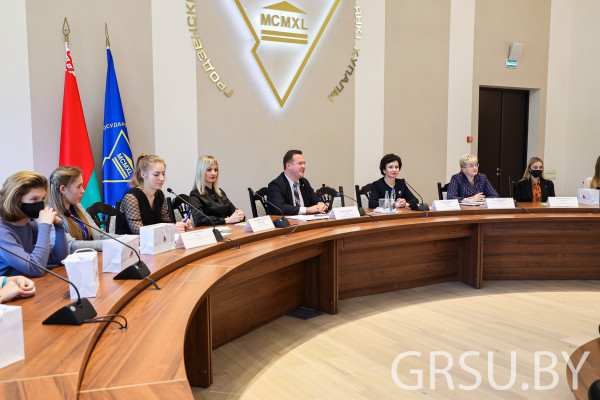
The speakers at the meeting were the rector of Yanka Kupala State University Irina Kiturko, the first secretary of the Grodno Regional Committee of the BRYU Andrei Yesin.
The meeting began with the congratulations of the Belarusian Republican Youth Union on its 19th anniversary. As Irina Kiturko noted, the organization's birthday is a big holiday for the university. The Youth Union never stands still and takes an active part in the cultural and socio-political life of the region. The rector of the University wished the regional Youth Union to continue to keep the brand of the best, never give up and continue to generate ideas.
"Membership in any organization is not just the availability to have a ticket and cash contributions. Members of unions and associations need to declare themselves, implement projects. And as a rector, I am interested in the primary organization of the university Youth Union being active and interesting for students, working in conjunction with the regional committee, because only acting as a united front can achieve high results. Mutual assistance and respect is a way of creation", Irina Kiturko noted.
The importance of joint work was emphasized by Andrei Yesin. It is necessary to act together, he said. The project "BRYU: strength in the team" is aimed at strengthening the unity of the Belarusian Republican Youth Union.
"The project will work for more active involvement of primary organizations in the life of the union, so that everyone can be involved in the common work. We always talk about the importance of setting high goals, active citizenship and courage. You don't need to be afraid to offer ideas, especially since many local projects then grow into republican ones", Andrei Yesin said.
After the presentations of speakers, a lively dialogue engaged. Irina Kiturko noted that she is always open to communication with students. They did not lose such an opportunity. Young people were interested not only in the strategic development of the university, in the attitude to the new state holiday "Day of National Unity," but also in personal issues. Students asked what events and traditions Irina Fedorovna remembered from her student years. The children also expressed gratitude for the opportunities offered by the university and the Belarusian Republican Youth Union.
Rector of Yanka Kupala State University took part in the congress of the Belarusian Society "Knowledge"

An extraordinary congress of delegates of the Republican State-Public Association "Belarusian Society" "Knowledge"gathered delegates from all over the country in order to discuss the prospects for the further development of the organization.
Among the participants of the event were the head of the Presidential Administration Igor Sergeyenko, acting chairman of the Knowledge society Valery Borodenya, rector of the Academy of Management under the President of the Republic of Belarus Vyacheslav Danilovich, representatives of state bodies and organizations from all over Belarus. The congress of the association was also attended by the rector of Yanka Kupala State University of Grodno Irina Kiturko. On the agenda delegates had a discussion of the results of the organization's work from 2018 to 2021 and the election of the board of the Belarusian Society “Knowledge”. The chairman of the association was the Dean of the Faculty of Philosophy and Social Sciences of BSU Vadim Gigin.
The development vectors of the organization were also identified, which received new areas of work. Despite the fact that the main task of "Knowledge" is to disseminate scientific knowledge, strengthen their influence on the development of innovative thinking and social activity of citizens, the Head of State instructed to strengthen the role of the association in the dissemination of socio-political, historical, cultural, popular science information both among Belarusians and outside the country.
A lecture on traffic rules was held for Yanka Kupala State University staff
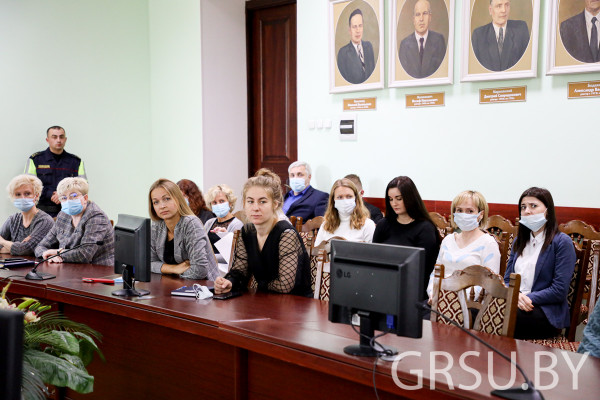
Inspectors of the traffic patrol service of the traffic police department of the regional executive committee Alexander Krasochka and Alexander Tybulevich informed the staff of Yanka Kupala State University of Grodno about the dangers that can meet vulnerable road users. It includes pedestrians, cyclists and those who move on scooters, sigways and other modern vehicles.
The lecture is highly relevant given that in the near future the daylight hours will be greatly reduced, which means that the probability of traffic accidents will increase. The inspectors recalled the importance of using flickers and asked not to forget about them. Alexander Krasochka noted that you need to be especially attentive at pedestrian crossings. Contrary to popular belief, zebra crossing is far from the safest place on the road.
The lecture attracted vivid interest, university staff asked questions that related to administrative responsibility, traffic rules for cyclists, the state of the road surface, and the processing of the Euro Protocol. At the end of the meeting, Alexander Krasochka noted that if controversial issues arise, you can always contact the regional traffic police.




